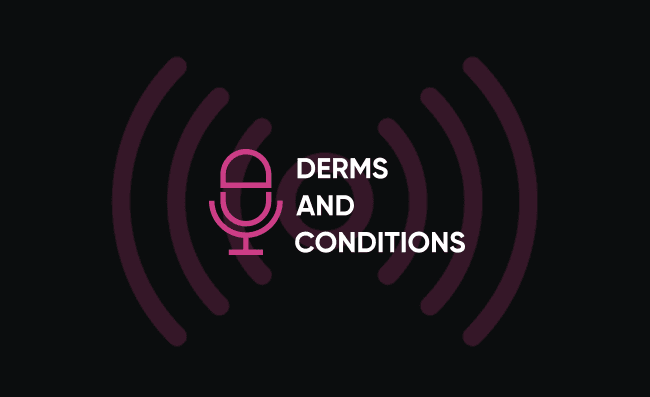Derms and Conditions Podcast Episode 112:
Mailbag #1: Your Questions Answered
Release Date: May 01, 2025
In this first mailbag edition of Derms and Conditions, Dr James Q. Del Rosso flies solo to answer your questions—submitted by clinicians across the country. From potassium monitoring to topical field therapy, it’s a rapid-fire round of guidance grounded in the latest literature, clinical experience, and practical wisdom.
Dr Del Rosso kicks things off with the ever-popular question: Do I really need to monitor blood potassium in healthy patients on spironolactone for acne? He breaks down current guideline perspectives, red flags for high-risk populations, and his own reasoning for when and why he orders labs.
Next, he walks through the expanding world of topical nonsteroidal agents for atopic dermatitis, including:
- Ruxolitinib 1.5% cream (Opzelura) – FDA-approved for mild to moderate AD in patients ≥12 years old and also for vitiligo; Dr Del Rosso discusses addresses black box warnings, despite low systemic absorption in most real-world scenarios.
- Roflumilast 0.15% cream (Zoryve) – Approved down to 6 years of age, well-tolerated with itch reduction data to back it.
- Tapinarof 1% cream (VTAMA) – Approved down to 2 years of age and used effectively in moderate-to-severe disease with favorable skin tolerability.
He explains why these newer agents may be preferred over topical corticosteroids for sensitive areas like the face. In response to questions about actinic keratoses, Dr Del Rosso dives into tirbanibulin 1% ointment (Klisyri), a microtubule inhibitor used once daily for five days. While FDA-approved for face and scalp field treatment up to 100 cm², he shares how he’s successfully using it off-label for forearms and hands, sometimes in combination with cryotherapy.
The episode closes with a discussion of oral antibiotic safety in acne, including:
- Why TMP-SMX (trimethoprim-sulfamethoxazole) works—but must be used selectively due to rare but serious adverse events (TEN, pulmonary toxicity)
- Why azithromycin is not optimal for acne and only used selectively.
- And why mandatory lab monitoring for oral tetracyclines like doxycycline or minocycline isn’t recommended routinely—but clinical vigilance is.
With insights on everything from lab work to lid margins, this is one episode you’ll want to bookmark, replay, and pass along to your dermatology colleagues.
